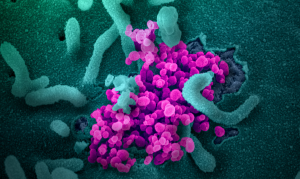Florida scientists have found that the novel coronavirus has mutated in such a way that it is making it easy to infect human cells.
However, they said more research is needed to determine if the change has altered the course of the pandemic. One researcher not involved in the study said that it likely has, and might also explain why the pathogen has caused a huge number of infections in the United States and Latin America.
Mutations worry scientists as they could turn out to be more deadly or more friendly. Researchers at the Scripps Research Institute, Florida, said the mutation affects the spike protein, which the virus uses to get into human cells.

The study is not peer reviewed and is yet to be published in the preprint server bioRxiv. If the findings are confirmed, this would be the first to show that mutations in the novel coronavirus have significance for the pandemic and its spread.
"Viruses with this mutation were much more infectious than those without the mutation in the cell culture system we used," said virologist Hyeryun Choe, who helped in leading the study.
WHO Said Mutations Don't Cause Serious Illness
Recently, the World Health Organization said that the mutations seen so far would not affect the efficacy of vaccines under development.
Last week, WHO also said that mutations had not made it more easily transmissible, nor had they made the virus more likely to cause serious illness.
Spike Protein
The researchers ran experiments and showed that a mutation called D614G gives the coronavirus many more spikes which are more stable, making it easier to get into cells.

The researchers sent their paper to famous virologist William Haseltine who is also a biotechnology entrepreneur and chairman of Access Health International. Haseltine believes that the findings explain the easy spread of COVID-19 across the Americas.
The paper showed that the coronavirus does change to its advantage and possibly to human disadvantage, Haseltine told CNN. "You can see in some places it doesn't get very far and in other places it has a field day."
Similar Research
Back in April, Bette Korber and colleagues of Los Alamos National Laboratory published concerns regarding mutation on BioRxiv. They called the D614G mutation "of urgent concern" as it was by far the most common viral strain spreading in Europe and the US.
However, more research is needed to show that it is not accidental that viruses having D614G mutation to be the most common forms.
"This virus is going to respond to whatever we do to control it. We make a drug, it is going to resist it. We make a vaccine, it is going to try to get around it. We stay at home, it is going to figure out how to hang around longer," Haseltine said.









